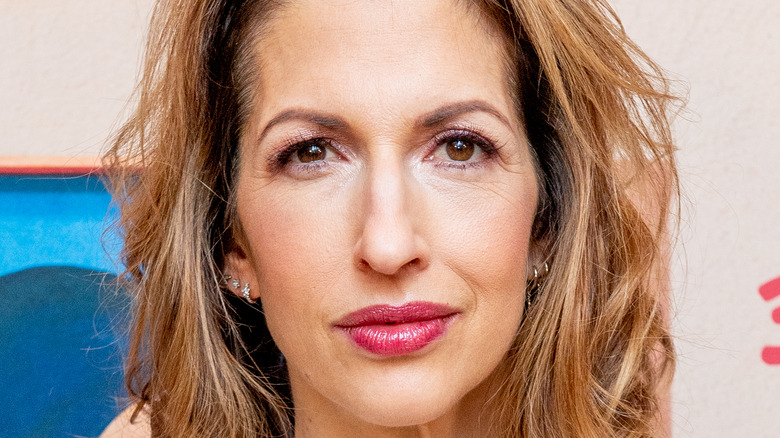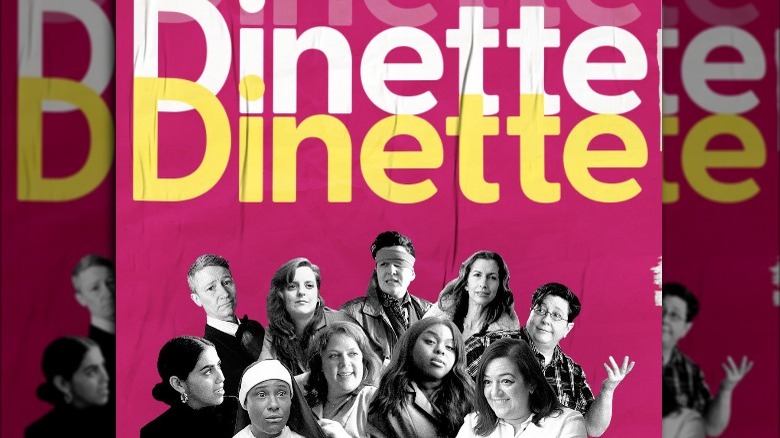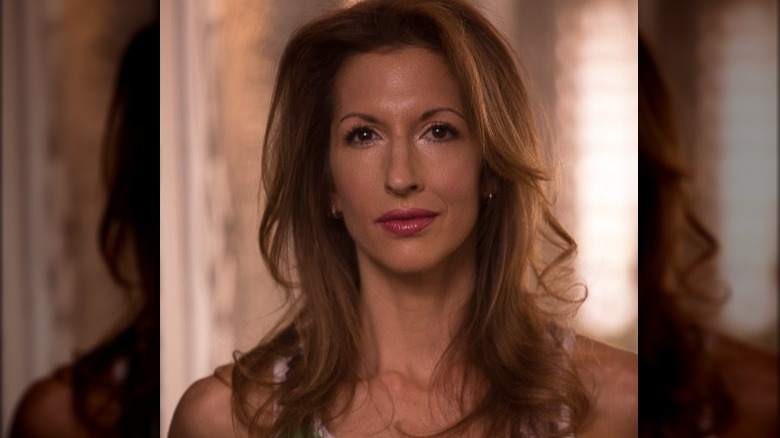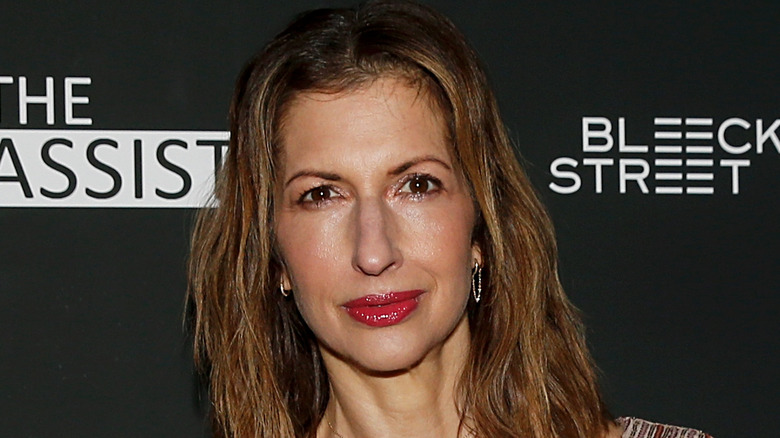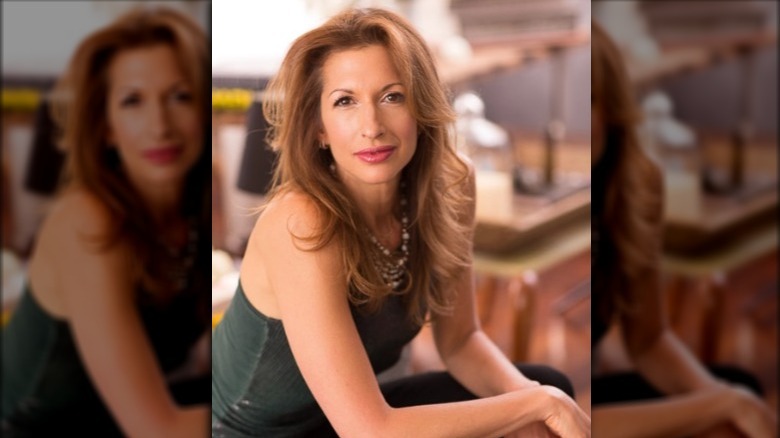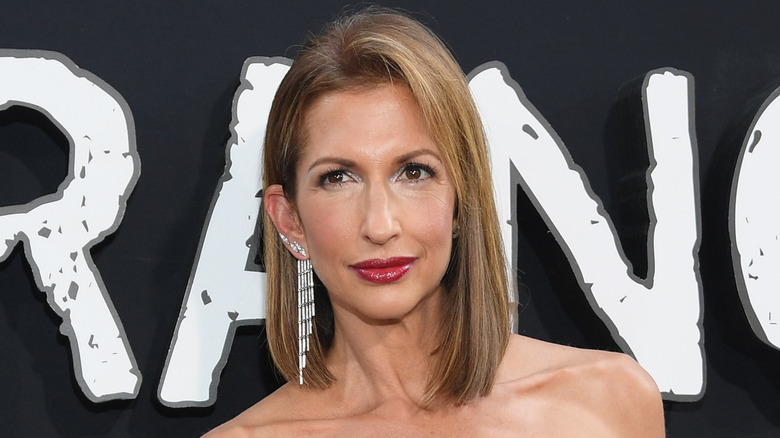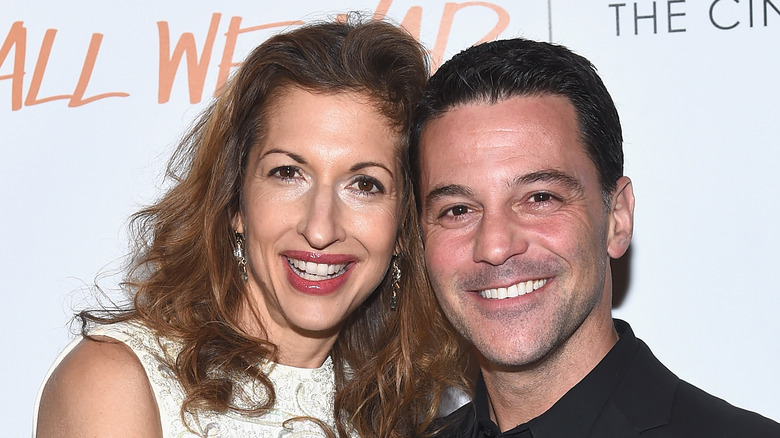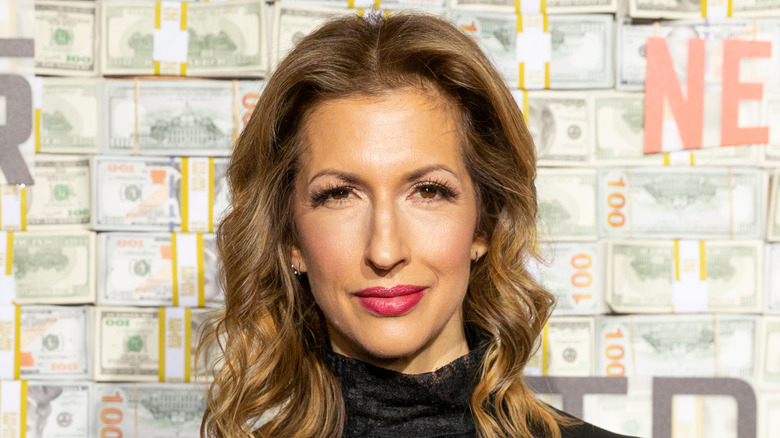Alysia Reiner Spills All On Dinette - Exclusive Interview
From stage to screen, actor and producer Alysia Reiner is a commanding presence. Though she's well known for portraying "tough, smart, bad-assie characters" like "Orange Is the New Black's" Natalie "Fig" Figueroa and D.A. Wendy Parks in "How to Get Away with Murder," the woman behind these iconic roles is a lot sweeter — but just as passionate about her work. A veteran of theater, film, and television, her latest role is Luisa in Season 2 of director Shaina Feinberg's BRIC TV web series, "Dinette," a passion project exploring female relationships, safe spaces, and community from the booths of a cozy Brooklyn diner. Its spotlight on women and minorities was especially important to Reiner, who's made it a point in her career to give underrepresented communities and stories the space in media they deserve.
Like her "Dinette" character, Reiner carries herself with poise and professionalism, with perhaps an extra dose of enthusiasm. In an exclusive interview with Nicki Swift, she spoke with palpable energy about her love for the crew behind "Dinette," her pride in being a working actor for 22 years and counting, and where her career is headed. Brandishing a "Ted Lasso" mug — "I love when art gets celebrated, especially art about kindness," she told us after the show's Emmy wins — and showing off her office space and exceptionally meticulous vision board, the "Better Things" actor oozed optimism while discussing "Dinette" and dancing, "Orange Is the New Black's" legacy, and the super-secret project that had her "jumping up and down."
Alysia Reiner is passionate about the message behind Dinette
So, as a Brooklynite, I have to say I love your new web series, "Dinette." It was such a fun, cute, quick little watch. I was wondering, how did you get involved with Season 2? Did you know director Shaina Feinberg before?
So, I met Shaina at a party. ... She's done a bunch of podcasts for Audible that are scripted podcasts, and they were really smart and really funny and easy to do and delightful. And I did one of those. And then I'm obsessed with her book and her column ["Scratch"] in The New York Times, like obsessed. I think everybody is. If you don't know it, you should. She does so much, she's the most prolific artist I have ever met in my entire life. ... So, she's amazing and she asked me to do it. ... I hadn't seen Season 1 and I watched Season 1, and she told me what she was interested in playing with. And my favorite thing about the series is it's about safe spaces — and in this world today, with so much deep, deep uncertainty, [exploring it] in a both comic and dramatic and true way. What does it mean to be a safe space? Be it for undocumented people, be it for the LGBTQ+ community. I'm deeply interested in that. And I love storytelling about things that people aren't talking about, and that's something that I feel like we aren't talking about that much.
And so she asked me to do this and I was like, "Sure." And it was so much fun. We had a beautiful time, and I had never met any of them. The first scene I did was the funeral scene and we won't talk about who dies, spoiler alert. ... It says a lot to me about her as an artist and the other artists there that I felt safe as an actor enough to really get into a grieving place very quickly. And it's interesting. I've never talked about this in my life, but to me, a mark of a really talented creative director is I drop into my truth and my creativity very quickly, and it's not hard to do my job. I have a lot of tricks for when I don't feel safe on set. I have a whole bag of tricks if I don't feel safe, but a brilliant director makes me feel safe immediately, and I don't have to work so hard. That's Shaina.
I know it's crazy watching "Dinette," because they joke like, "Well, this diner is one of the only safe spaces we have," and it is so true. Even in New York, there aren't a ton of lesbian bars.
Yeah, two of my friends are deeply involved with The Lesbian Bar Project and actually my dream that I'm just going to keep on putting out into the universe is that the Lesbian Bar Project and "Dinette" do a collaboration for Season 3. ... Wouldn't that be cool? Because Lesbian Bar Project is all documentary and wouldn't it be cool — sponsored by Jägermeister, of course, because I love Jägermeister — if we played with how we can create a collaboration that creates more notice to actual lesbian bars and more safe spaces and do some fun scripted drama in there?
Oh yeah. These characters would have loads of fun in a bar. I can already tell.
Maybe we bring the characters on a little road trip to each different actual lesbian bar in the city.
How does her Dinette role differ from the characters she usually plays?
So, talking about your character, Luisa — she's a little hard to peg down at first, but we get to see a bit of her softer side. What was it like playing a character that wears her heart on her sleeve a little more than when you're playing Fig or like a DA or an agent?
I tease a lot, and my reps know this very well. Like I get, I don't want to say typecast, but I play a lot of tough, smart, bad-assie characters. It's kind of where I live on screen and have for a long time. We're in the middle of shooting Season 5 of "Better Things" right now, and Sunny's a little bit less of a badass, and that's been five years of that. I get to just be a best friend, which has been delightful.
I just finished this new show called "Shining Vale" for Starz with Courteney Cox and Greg Kinnear, where I'm also sort of like the happy, nice girl. And it's been such a joy not playing the badass. ... And then I just did a [secret project that I'm not allowed to talk about] and a movie, which is called "Going Places," [that] I'm allowed to talk about, [and] we're back to the badass. So now at least it's 50-50 maybe, not a 100% tall, rich b**ch, badass.
All the girls in "Dinette" think Luisa is the badass, but we get to see she softens up a bit, there's some heart. You're part of a really diverse ensemble cast — was it as much fun to film as it is to watch? It looks like you guys are having a blast.
It's so fun. You know, the thing with a series like this is, we do it on a scrappy, scrappy budget. We do it because we love to do it. We're not doing it for the paycheck, you know, and you do it really fast. You have like one, maybe two takes. And there's a little bit more freedom to play, and it's fun. It's really, really fun. And I think as an artist ... I've done a lot of film and television over the past few years and I haven't, especially with COVID, haven't gotten to do theater in a while, and I really miss it.
And it's my hope that, throughout my career, I get to do all kinds of projects at all kinds of times. A tiny series like this that's fun and scrappy and creative, and something big, big, big budget like I did this year. And you know, I did a bunch of scripted podcasts this year because of COVID, and I did my first video game this year. And I am the voice of a cartoon, and actually ["Dinette" director Shaina Feinberg] and I are developing an adult cartoon together based on enjoying each other's work so much. So it's so fun doing all kinds of projects. And I hope throughout my career, I'm able to do that.
After years in the business, Alysia Reiner has fun on set
I love that. I think that's the heart of a true performer who's in it for the right reasons. It's like this passion, not like this, "I'm not too good for theater anymore."
Oh my God. There is no such thing. Especially, there's incredible content on YouTube, on TikTok, on Instagram. Content is art is art is art. Content is content is content. And I love it all. I love what Michaela Coel, who won the Emmy for "I May Destroy You," ... talked about [in her acceptance speech] about fitting in and success, and that these two things don't necessarily need to meet. And for me, success is like making. On my bulletin board, it's probably in there somewhere. I created the expression for myself, "Don't wait, create." Because when I was a young artist, my husband was a very, very, very successful white male. And he would get 10 auditions, and I would just sit there, waiting for one. And he got a lot of work when I just couldn't even get an agent. And I had to teach myself, and it was deeply uncomfortable to go, "Okay. I have to make my own stuff to feel joyful as an artist."
And I had to really get into the cells of my body that no art is better than any other art. And success is great. I'm using my "Ted Lasso" mug because I love when art gets celebrated, especially art about kindness and art that is written by friends of mine, like Ashley Nicole Black [who writes for "Ted Lasso"]. But I love, love, love when art gets celebrated, and it is such a hook for artists to feel like success is being celebrated and being lauded. Because success is making. Success is just doing, in my opinion. The thing that brings me joy and helps me sleep at night is the doing, not the Emmys. Like, don't get me wrong — it's all awesome! I love that stuff, and yes, more please.
But at the end of the day, you spend a lot more days on set and creating. And that has to be, for me, why I do it — the joy of creating, no matter what. This movie I did this summer was small budget and they're hoping for Sundance; I sure would love that. But I had so much joy doing it, because I was working with fantastic people and I was telling the stories I've never told. And that's how I feel about "Dinette." The joy is in the doing for me, the art of it, the play of it, of like, "Oh, I like you. I want to play with you. This is fun. I feel safe playing with you." And we're telling a story that I think needs to be told, where we're talking about things I really want to put forth in the world to help heal us as a planet.
On the topic of fun, you have a kind of softer, sultry dancing moment in one of the episodes, and they all end with a dance number to the theme song. Are you a dancer? Was that natural?
No! My mom was a ballerina with New York City Ballet when she was a kid. And so even though she quit when she was like 10, there was always this ... I think mothers and daughters are super complicated, as you can see from "Better Things" and "Orange Is the New Black"; any brilliant writer is always talking about mothers and daughters, right? ... I can go off, but I never wanted to be a dancer, because I felt like I'd never be as good as her. And I was also kind of a fat kid and teased, so I didn't want to dance, because I wasn't comfortable in my body, but behind closed doors ... just like people sing in the shower, I would dance out ... I was always like a Martha Graham girl. I was never excited about ballet or jazz or tap. Give me a little modern dance music, which could be really anything, and I'm so into it.
Same here. No choreography, but I can feel a little rhythm.
When I got married a very long time ago, because I met my husband when I was in school, we did dance lessons before the wedding. Like Fred Astaire, like that pack of 5 for $9.99 or whatever. And we got into the biggest fight, because he was just like, "Stop, stop moving your hips. I can't concentrate." So at least Drae [Campbell, who portrays Mick in "Dinette"] did not feel that way.
Alysia Reiner wants to do work that makes the world a better place
So, I love this show, and a lot of your work, "Orange" and "Better Things," they all kind of seem to speak to what I would assume is your mission statement as an actor, it's these really strong female characters and these stories that aren't being told or haven't been told enough or as deep. Is that something that's been important to you for a long time? Or is there a point in your career where it was like, I want to do this kind of work?
I think I always wanted to tell stories that make the world a better place. I wanted to illuminate stories and shed light on stories that were not being told. I also produce, and my first movie that I produced was called "Equity." It was the first ever female-driven Wall Street movie and we went to Sundance and we sold to Sony Pictures Classics, and we hired more women than men for that project. And I was so interested in telling the story of women, and so much of what we've talked about in the past six years, because that was 2015, is what we talk about in that movie in reference to sexual harassment at work and double standards and equal pay, like all of the things. ... It was talking about all that stuff before it got a little bit more known to the general public, before its sort of tipping point.
And then the next story I told as a producer is called "Egg," which is about choices in motherhood and how we view the role of mother, and what it means and the choice not to be a mother. And again, I had never seen that explored deeply and was really interested in that. So as a producer, I get to choose the stories I get to tell. As an actor, you don't really get to choose that much, you know. Bless, bless, you're Jessica Chastain, and you're always making choices. But as a working actor, which I consider myself to be, I feel lucky when things come across my desk, where I'm like, "Yes, I need to tell this story." And "Orange" was one of those. I auditioned for so many roles on that show. I will never forget first reading it, and I first auditioned for Alex and then they had me audition for like three other roles. And then I got the offer for Fig, and it was like two lines. And I was just like, "Yes." And then it became this beautiful seven-year journey.
And same with "Better Things." Everyone is like, "Oh my God, you and [co-creator Pamela Adlon] must be best friends." And I was like, "We've never met before." We had never met, and I hadn't even read a full script. ... The scene I read, I just found her writing so interesting and real. It was like a feminist curve ... is how I read it when I first read it. I texted her today, because I just read this last episode [of "Better Things"], and I said, "You are the feminist Cassavetes for our generation."
The way she is as a storyteller and cinéma vérité, I think you call it ... she just tells truth in this super gritty, delicious, authentic way. And particularly motherhood [in a way] that it's like nobody else. Like in this magical, magical way that I think we will look back and go, "Holy f**k. She's telling truth in a way that nobody else was." And so to be part of that storytelling, I'm going to get a little teary, because you know, we're about to shoot this last episode, and I'm going to miss it. It's like "Orange," you create a family. ... A great set becomes a family. And with "Dinette," we were together too short to be a family. They were together longer, but I was only there for like two days. So that's not a long time to become a family, but I love Shaina enough that I'm like, "Come on, let's find something else to play with together." 'Cause you find your people and you want to play with them.
She misses her Orange Is the New Black character, Natalie Figueroa
So, I would be remiss not to ask: "Orange Is the New Black," huge part of your career. Two or three years since the finale, how does it feel being removed from it for a little longer? Do you still keep in contact with anyone from the show?
I do. I miss Fig. I miss playing as her. She's such a specific human, and I miss how sharp and fast and Figgy she is. And I miss Nick [Sandow, who portrayed Caputo] and playing with Nick. And I am still friendly with a bunch of the people, Beth Dover — who played Linda from accounting — ironically, my arch nemesis and I, are very close. And I see Taylor [Schilling, who played Piper] sometimes, it's like we all celebrate each other. There has been so many beautiful celebrations over the past [two or three years]. A lot of weddings and births and all this beautiful, beautiful abundance in life, as well as career. So, we definitely miss all of them.
It's probably nice, because it really was such a New York show that I'm sure there are still a decent amount of cast members still around.
Yeah.
The COVID pandemic allowed Alysia Reiner to connect with herself and family
So, you're a very busy actor. We've talked about all your different projects over COVID, but I'm sure that definitely kind of put a bit of a hiccup in things. What has it been like getting back to sets?
Early, early times ... I was in Fire Island from like March 11th till October. Really extraordinary. ... We have a home out there, and I felt so safe because it's such an outdoor community. There were so few people, there are no cars. There was a lot of social distancing, and it felt really safe. And I felt incredibly grateful for that space. And so grateful, in fact, that I am now training to be a volunteer fire person in [Fire Island].
But anyway, early on, I did a lot of Zoom readings and workshops. We did a lot on the Zoom. And then I had an idea for a way to make a movie, and we played with this experimental movie piece, and we'll see whatever happens to that. And then my husband [David Basche] and I were asked to do a couple projects on set that we said no to, because they were too small and they didn't feel safe enough.
And July through October 2020, it felt like it's just not worth risking my life for, you know. And then in December, we came back to New York. My daughter started school in person in a very, very, very safe way. And in December, I was offered this secret job, but it was with a company that had been making a lot of things and had a lot of, let's be honest, money, to be able to do it safely. So the minute my deal closed, they sent a COVID tester to my house, and I was tested every single day. And the scariest part about it, honestly, was going on the plane. And then it was really challenging because ... I'd been with my daughter for the longest I had been in my life, like every single moment of every single day. And then I was away for the longest I had been in my whole life, because I couldn't fly back for a weekend. But we all stayed very, very safe. The set felt safe, and then I would go to set and go home. I would take long walks in parks, but that's about it. I was in a different city, not New York or L.A.
And then when that was over, I guess March 2021, I got offered this movie, and it was right after I had gotten vaccinated, and I felt like I can do anything. And we did this movie, and I felt so safe because it was like, I'm vaccinated. And it was before the Delta wave, quite honestly. And even there, though, everybody was masked, we were testing everyday. Like, sets felt safer than a lot of other work environments, you know?
And then I started shooting "Shining Vale" [with] Warner Bros. — also an incredibly strict protocol. And same with "Better Things," very strict protocol. Two things: For me, when I'm on set, which I've been pretty much since December, I feel so deeply responsible for hundreds of people that my behavior then gets super small. Because I would never put other people in danger. And that's the thing for me about COVID, is it is about your community. I'm not making choices for my own health or even my family's health, I'm making choices for my entire community and the people I work with. So it's a whole other layer of responsibility. And like I was saying, when I'm wrapped with everything, might I go to an indoor class, like at a gym with only fully vaccinated people? Maybe, but right now I won't because there is Delta, and I am trying to be deeply responsible to my community.
And there's also this feeling ... there's a safety in being tested almost every day or every day; it feels kind of good. And in my two-week break between projects when I'm not tested every day, every time that happens I'm like, this feels scary not to get a test, not to get a result every day. My daughter, in her whole first year of school, was tested three times a week. And I loved that, because it was sort of like, well our whole family was being tested there three times a week.
Alysia Reiner on her super-secret project and the future of Dinette
So, I am sure you are sworn to complete secrecy on this super-secret project, but the internet has some ideas. So, would the words "Ms. Marvel" mean anything to you? Does that sound like something?
I've heard of that show? If someone were to ask me to be on a show about a feminist badass Muslim superhero, I would be jumping up and down, but you know, that's just if that were to happen.
A complete hypothetical, of course. Well, I think that's about it. Did you have anything to add about "Dinette" that I might have not asked?
I'm really excited for people to see it. During the pandemic, I did a workshop of a new play that I love by a brilliant, brilliant artist named Diana Oh. And it's called "My H8 Letter to the Gr8 American Theatre," and we shared some cast members of "Dinette," ironically. I just think everybody in "Dinette" is so super talented, and I'm excited for the world to see it. And I hope we get to play more.
So Season 3, it's a maybe?
It's a maybe. Fans need to say to BRIC TV — or, I think The Lesbian Bar Project should like, do a collab. That's just my personal, crazy idea. I know the director of that, Erica Rose, and obviously ["Orange Is the New Black's] Lea DeLaria, so I think that would be super fun.
Some good manifesting on this.
Yeah. I'll put it on the vision board.
Season 2 of Shaina Feinberg's "Dinette" is available September 24 after its 10 pm premiere on BRIC TV's YouTube Channel.

